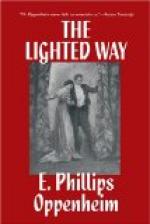Arnold rose abruptly to his feet.
“You treat men as though they were puppets,” he muttered.
“And you speak of puppets,” she murmured, “as though theirs was a most undesirable existence. Have you never tried to be a puppet, Arnold?”
He stepped a little further back still and gripped the back of the chair, but she kept close to him.
“I am to have no other answer from you, then, but this foolery?” he demanded, roughly.
“Why, yes!” she replied, graciously. “I have an answer ready for you. You are so abrupt. Listen to what I propose. We will go together to your office and see whether it is true that Mr. Weatherley has not returned. If he has really disappeared, and I think that anything which I can tell you will help, perhaps then I will do as you ask. It depends a great deal upon what you find in those papers. Shall we go now, or would you like to stay here a little longer?”
“We will go at once,” he said firmly.
She sighed, and passed out of the door which he had thrown open.
“It is I who am a heroine,” she declared. “I am coming down to Tooley Street with you. I am coming to brave the smells and the fog and the heat.”
He handed her into the car. He had sufficiently recovered his self-control to smile.
“In other words,” he remarked, “you mean to be there when I open the safe!”
CHAPTER XXVII
THE LETTERS IN THE SAFE
The arrival of Arnold, accompanied by Mrs. Weatherley, created a mild sensation in Tooley Street. Mr. Jarvis, fussier than ever, and blinking continually behind his gold-rimmed spectacles, followed them into the private office.
“You have heard nothing of Mr. Weatherley?” Arnold asked.
“Not a word,” the cashier answered. “We have rung up several more places and have tried the hospitals again. We were all hoping that Mrs. Weatherley had brought us some news.”
She shook her head.
“Mr. Weatherley left home exceedingly early this morning,” she announced. “I believe that it was before half-past seven. Except that he called at the house in Hampstead for the letters, I have not heard of him since.”
“It is most mysterious,” Mr. Jarvis declared. “The governor—I beg your pardon, Mr. Weatherley—is a gentleman of most punctual habits. There are several matters of business which he knew awaited his decision to-day. You will excuse me, madam, if I ask whether Mr. Weatherley seemed in his usual health when he left this morning?”
Fenella smiled faintly.
“Have I not already told you,” she said, “that he left the cottage in the country, where we spent the week-end, before half-past seven this morning? Naturally, therefore, I did not see him. The servants, however, noticed nothing unusual. Last night Mr. Chetwode here was with us, and he can tell you what was apparent to all of us. Mr. Weatherley seemed then in excellent health and spirits.”




